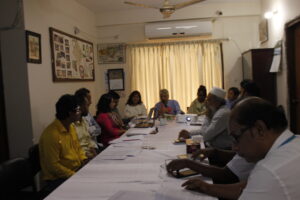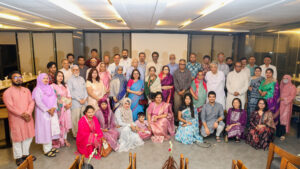Dhaka, 21st October, 2019: Every year, about 87,000 tonnes of single-use plastic are thrown away in Bangladesh. The findings revealed from ESDO study. The study findings were disclosed through a press briefing arranged by Environment and Social Development Organization-ESDO on Monday at its head office.
This year ESDO has completed its second annual survey of plastics use in Bangladesh, which focused exclusively on single-use plastics (SUP). The organization surveyed over 800 people in urban and rural areas of Bangladesh ESDO surveyed over 800 people in urban and rural areas of Bangladesh, asking detailed questions about what types of plastic they use, where these plastic items come from, and how they are disposed of. In addition, the study integrated the findings from ESDO’s 2018 study survey of 1200 people from four major divisional cities (Dhaka, Chittagong, Rajshahi and Sylhet) to derive a comprehensive overview on urban situation. From this survey data, ESDO estimates from single use plastic waste, about 96% of which is from food and personal care products. About 35% of the total of these wastes are sachets, which are completely non-recyclable. Most single-use plastics used in Bangladesh are not disposed of properly, and so they end up in the lakes, rivers, or in the ocean. The UN Environment Programme estimates that 73 thousand tons of plastics waste ends up to the sea through Bangladesh’s major rivers Brahmaputra, Meghna and Ganges. ESDO’s study indicates that over 2,000 tonnes of single-used plastics are used by restaurants every year, with an additional 700 tonnes coming from airlines and 600 tonnes from hotels.
Single-use plastics are those plastic which can be used only one time before thrown away or recycled. It includes plastic bags, drinking straws, bottles, cotton buds, Sachets, food packaging, coffee stirrers and many more. Most plastics do not biodegrade; instead, they slowly break down into smaller fragments known as microplastics. In this breaking down process, they release different toxic chemicals that eventually enter into our food chain and water supply. And now days, it has been found in our bloodstream. The latest research has been linked them to different physical conditions such as cancer, infertility, birth defects, impaired immunity and many other diseases.
ESDO Chairperson and former Secretary Syed Marghub Murshed, Prof. Md. Abul Hashem, former Chairperson and Professor of the department of Chemistry, Jahangirnagar University, Secretary General of ESDO Dr. Shahriar Hossain, other study team members of ESDO along with journalists from electronic and print media were present on this press briefing. Syed Marghub Murshed said, “Because of plastic pollution everything suffers tourism, recreation, and business, the health of humans, animals, fish and birds. The financial damage continuously being inflicted is inestimable. Plastic pollution is dangerous. Single Use Plastic leached toxic substances gets accumulated in the environment by contaminating air, water and soil, from there humans inhale and ingest these and suffer from vulnerable impacts. So immediately we need efficient solution otherwise we can’t control the flow of plastic pollution.”
Professor Dr. Md. Abul Hashem said. “In everywhere we get to see the use and wastage of single use plastic is the most. This is why we need to create awareness among the mass people. Most of the people don’t ever think that plastic can cause a serious health impacts in human body. Direct exposure of Single Use Plastic happens through inhalation, ingestion and direct skin contact within the plastic lifecycle.”
To cut down on plastic pollution, ESDO is putting forth recommendations for consumers and for the government. ESDO strongly recommends that the government of Bangladesh pass a complete ban on SUP. “Bangladesh must follow the example of India and other nations in banning single-use plastics, or we risk being overwhelmed as manufacturers and importers turn their attention on us,” says ESDO Secretary General Dr Shahriar Hossain. “Banning single-use plastics is a necessary move to protect the health and environment of Bangladesh. Fortunately, cost-effective alternatives are widely available.” For instance, straws made up of bamboo sticks are being widely used and manufactured in hilly regions of the country. In Kushtia district, compostable ice cream cups are produced from leaves. “Local production of plant-based alternatives can provide rich opportunities to increase local sustainable manufacturing and jobs throughout Bangladesh,” explains Professor Dr. Md. Abul Hashem.
Although Bangladesh banned single-use plastic shopping bags in 2002, ESDO notes that the country has fallen behind in regulation since then. Many countries already have banned single use plastic. However, in Bangladesh, the issue is yet to be addressed with greater priority owing to lack of public awareness. ESDO’s survey report reveals that nearly half of the total SUP consumers from urban areas lack knowledge of the adverse impacts of plastic pollution.



